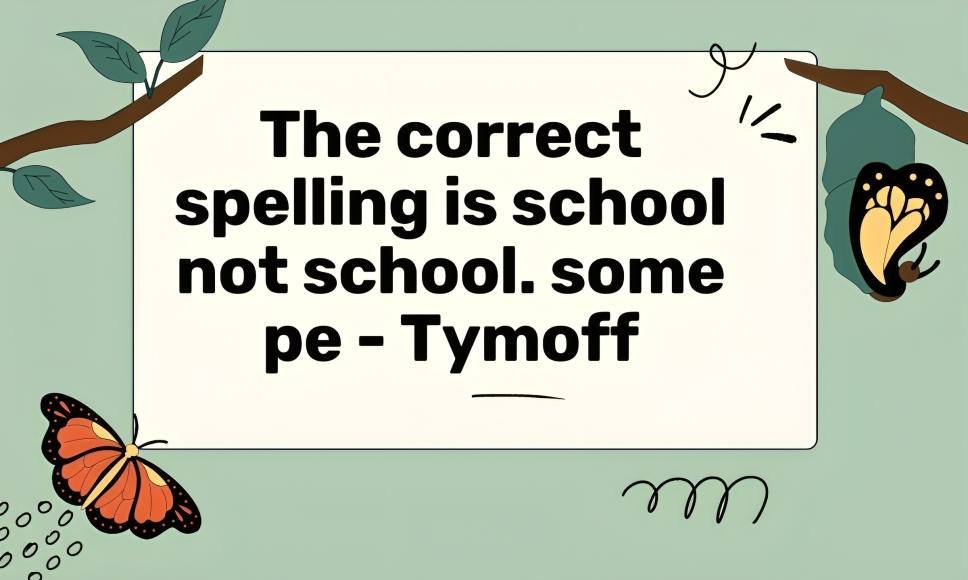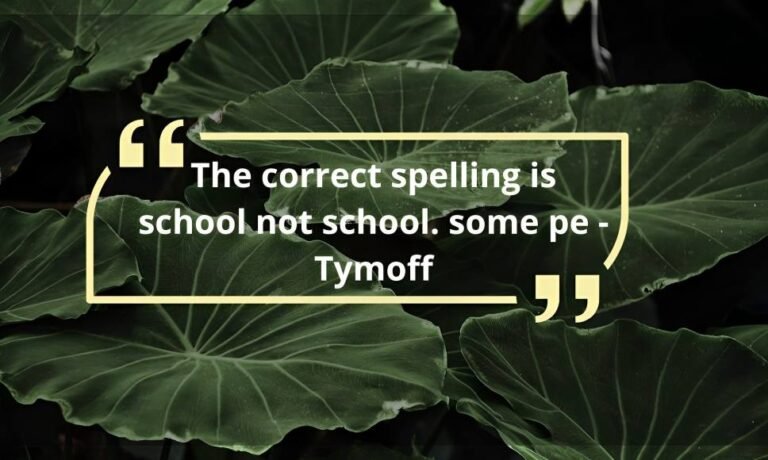In this light, “school” is a timeless image of studying. It’s in the giant landscape of education. It is a fort wherein information is dispensed and talents honed. Schooling has been informal. It has been this manner due to the fact that its earliest variations. It has been institutionalized into systems. This record speaks volumes. It indicates how teaching has been fluid and changing. In this article we will explore the correct spelling is school not school. some pe – tymoff.
Educational Background
Schools were now not there in any such complete form. They grew from casual get-togethers. At these activities, knowledge changed into shared with a mentor. From these systems, the formal establishments formed.
Formal Education Takes Root:
Societies grew and became extra complex. They found out the need for a proper training device. Communities started building infrastructure to gain knowledge. This shifted learning from disorganised to systematic.
Curricular Development:
These curriculums started by means of focusing on analysing. They also centred on faith. Over time they expanded to include many other subjects. These topics meditated the desires of the society. The curricula delivered sciences and languages. They did this to reflect the general method of learning.
Modern Schooling:
The essence of schooling stays the same. But, modern-day schools have needed to adapt to society’s shift and tech development. The curriculum has to alternate. It wishes to include new fields. These fields will let college students live in a changing world.
Unlocking the Mystery of “School”

The Fixing Chant:
The phrase “school” appears harmless. But, there is a small strangeness in its spelling. The “ch” becomes silent. This strangeness creates many viable misspells. For example, “school.””
Roots of Misspelling:
That’s the cause for many misspellings. The “ch” sound is complicated. There also are homophones and cultural elements. Yet, with training and practice, he can triumph over that barrier. He can sooner or later get the spelling proper.
Relevance Sign:
Spelling is more than just being efficient at it. It entails a good deal extra than that in phrases of use and literacy competencies. Spelling correctly is fundamental to proper communication. It’s a sign of credibility and care for detail. These are elements of appropriate writing.
Navigating the Landscape of Spelling “School”
That way, sounding out the phrase and breaking it into syllables may help in seeing how to spell it. It isn’t as tough as it is frequently considered.
Repetition and Reinforcement:
For example, on the ideal spelling of “school,” use it in writing. Keep a private word bank for review and consolidation. Teachers are key for learning spelling. They give advice and help to beginners. The beginners are seeking linguistic talent.
Surviving the Pitfalls of Technological Help
Double-edged Sword:
Autocorrect is supposed to restore misspellings. But, it frequently “fixes” things that are not genuinely wrong. So, the person learns incorrectly. The gadget reinforces the “wrong” word. The person must be ever-watchful and continually crucial.
Autonomy vs. Dependency:
This might allow students to use words they know. They would no longer need technological crutches. It might empower them and recognize language. But, it would keep away from the risk of overusing autocorrect.
The Role of Playful Language and Slang
Balancing Act:
Slang and playful misspellings belong in informal talk. But, educators walk a fine line. They do not want to make wrong spellings normal. Normalizing them can harm formal language skills.
Cultivating Linguistic Flue:
We should encourage the student to be flexible with language. But, they should keep a strong base in basic spelling. This will help them work well in any language they encounter.
Sailing the Lexical Labyrinth is about dictionaries and spelling tools.
Reference Power:
Dictionaries are a reliable guide. They give the correct spelling. In times of doubt, they are the usual reference.
Technological Aids:
Spelling resources are very helpful now. They provide spelling lists, games, and tests. These things help improve spelling skills.
Conclusion
Learning the Linguistic Tapestry is a maze of language. To spell words such as “school” means more than just spelling right. It is a step toward fluency in a language. Fluency leads to the skill of good communication. We must encourage many strategies. They mix sound awareness and rote practice. They do this with the tools tech can provide. The strategies must help lead the students. They will be led through the maze of spelling. The student will eventually master a hard process. They will do it with confidence and precision. They will leave the correct spelling of “school” as an indelible mark.
FAQs
Ans: Proper spelling of “school” is vital. It is key for academic and professional writing. Good spelling shows care. It also makes text easy to read.
Ans: Students will do better in spelling by sounding out words. They should repeat and reinforce this with their teachers. They should use many spelling tools and resources.
Ans: The “ch” sounds are complex. Homophones, culture, and autocorrect cause people to misspell “school.””
Ans: But, this is where spell-check may lead to bad spelling. So, be cautious and rely on your knowledge of the word, not the other way around.
Ans: Educators scaffold language flexibility. They also admit this and promote basic spelling skills. At the same time, educators should also warn against embracing misspelling. They should do so in formal settings. They should also respect the depth of play-based language. This language is used in informal ones.
Also Read About:
